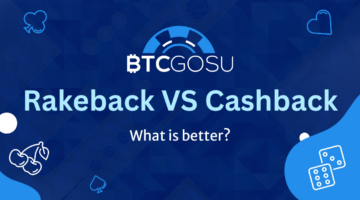If you have been paying attention to BTCGOSU and the online gambling landscape at large, you probably have come across the sweepstakes casino phenomenon, sites that also bear the name social casinos. These are platforms, usually run by crypto-gambling operators, that attempt to get a slice of the US player pool by offering them the same games they do to their international customers on hubs that adhere to US gambling laws, ones that implement the sweepstakes model.
What is the sweepstakes model, you ask? These are promo laws that allow companies to run contests in which prizes get supplied based on chance. Unlike a lottery, a sweepstakes does not require a purchase for participation. Thus, because one is not staking anything, this is not gambling, right? Well, not exactly, as we all know what this is in the context of social gaming, but operators are exploiting this legal loophole and offering casino-style games to US residents in over forty states. They are essentially leveraging the same no-purchase-necessary scheme that contests like McDonald’s Monopoly have in the past, and virtually all of these platforms employ a dual-currency system: Gold Coins for entertainment only, and Sweeps Coins for redeemable prizes.
Over the past year or so, this industry section has skyrocketed in popularity, as more and more offshore operators are launching US-centric social/sweepstakes casinos, and this sphere is now on route to start pulling in $11.20 billion annually in the next three years, growing at a rate of 8.8% yearly.
However, things are not going as smoothly as they seemed a few months ago in this field, as multiple US states are now amending their gambling laws to factor in these sites, and they are looking to ban them altogether, as the entire social gaming landscape is currently facing much uncertainty.
What Is the Sweepstakes Loophole?
These platforms exploit the legal distinction between promotional contests and gambling. As noted above, that is rooted in the no-purchase-necessary rule. It is what separates sweepstakes from illegal lotteries. These platforms sell a valueless virtual currency — Gold Coins, which cannot be redeemed for prizes — but they allow the purchase of a second currency — Sweeps Coins — and that one holds a monetary value; it can be redeemed for cash, gift cards, or cryptocurrencies. To comply with sweepstakes laws, sweepstakes casinos offer free Sweeps Coins through mail-in requests, daily logins, or social media promotions. They do this so they ensure that no purchase is required, adhering to the mentioned rule.
The games offered on these platforms are the same as the ones found at top crypto casinos, meaning titles from providers like Hacksaw Gaming, Pragmatic Play, NetEnt, and the like. By framing their operations as promotional sweepstakes, they evade the licensing, taxation, and consumer protection rules that apply to real money gambling operators. Hence, they use a lucrative but legally precarious business model.
Sweepstakes Casinos Are Under Attack
While many thought that operators had a good thing going with the social gaming model, it was more than clear that US authorities would start clamping down on these sites once they gained some traction and grew their user pools. The real money land-based/online US casino sector does not take too fondly to these hubs, which take away players from their sites. They have their lobby and have put it to work in various states, and in others, lawmakers and politicians have expressed concerns and taken action against these platforms, labeling them no different than standard online casinos.
There is currently a class-action lawsuit in Alabama against Stake.us, which alleges the platform’s dual-currency system allows the US version of Stake.com to function as an unlicensed casino in a part of the US that does not regulate interactive gaming. In the US, only seven territories permit online casino gambling — Pennsylvania, Michigan, Rhode Island, Delaware, Connecticut, New Jersey, and West Virginia. These are states with gaming regulators that issue licenses to operators willing and authorized to offer remote gaming services. Sweepstakes casinos operate with no gaming license while offering a similar service.
Their growth has spurred legislative pushback in multiple parts of the US as New York’s Assembly Bill 6745 and Senate Bill 5935, introduced in 2025, aim to ban these platforms, with penalties extending to operators, suppliers, payment processors, and investors. Louisiana’s Senate Bill 181, passed in April 2025, classified them as illegal gambling, and Montana’s Senate Bill 555, awaiting gubernatorial approval, too, looks to ban the dual-currency system. Connecticut’s Senate Bill 1235 seeks to also prohibit this, what it calls unlicensed simulated gambling, and Florida is making great efforts to render all sweepstakes casino games illegal. The Sunshine State’s House Bills 953, 1017, and 1467, and Senate Bills 1404 and 1836, further target dual-currency systems, aligning with the Seminole Tribe’s exclusive gaming compact.
Thus, it is clear that the noose on sweepstakes casinos is tightening, and things could turn dire quickly for these sites.
Economic Incentives for Allowing Sweepstakes Casinos
Are there any? Of course. Money can get made through payment processing fees, affiliate marketing revenues, and tech infrastructure/support services. On top of the money generated by gambling operators for running these platforms and the jobs this would create. Although most of these companies active in this US field operate outside the borders of the US, they do not bring in direct jobs to the United States per se. Still, they may create indirect gig economy jobs via affiliate partnerships and influencers and hire US support teams, and winners have to file taxes.
But real money online casinos would generate more money for local economies and governments, so it does not make much sense to allow these foreign-based companies to operate in this field. They would only disrupt active internet US-based operators and bring casino gambling to people in regions whose governments have not yet allowed this.
Ethical & Societal Concerns
These are quite obvious, as these platforms mimic real-money gambling without any real regulatory oversight, which poses a host of risks. Addiction-prone individuals can use them with minimal consumer protections, exacerbating their issue, and youth exposure is no doubt, too, a pressing issue, given that these platforms operate on unregulated digital channels like social media.
Unlike regulated casinos, we also must highlight that sweepstakes platforms contribute nothing to addiction treatment or public health programs, leaving states to bear the burden of financial and mental health distress.










Login
Register